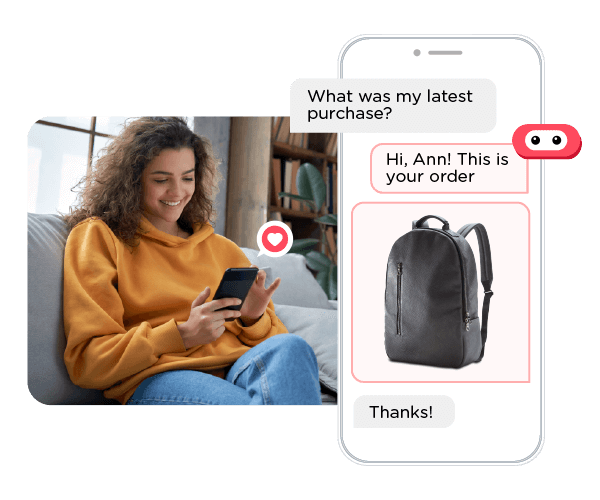- What is a customer service chatbot?
- AI in customer service
- Customer service chatbots vs human agents
- The business benefits of customer service chatbots
- How to improve customer service with chatbots
- Low code/no code chatbots
- Let’s talk about customer service chatbots
On the flip side, ineffective customer service is frustrating for customers. According to January 2023’s UK Customer Satisfaction Index, while customer satisfaction is at a similar level to 2022, satisfaction with complaint handling has dropped from 65.8% in January 2022 to 63.3% in January 2023. While that doesn’t sound like a significant decline, it does signal the end of a longstanding upward trend in complaint resolution satisfaction.
Often customer service workflows aren't aligned with the customer journey, and sometimes, customers have complex issues that agents can’t resolve in a single contact. Frustrations can quickly arise when customers have to contact agents repeatedly or wait a long time before agents come back to them.
But placing these issues on the shoulders of your customer service agents wouldn’t be fair. It's likely near-impossible to retain the knowledge your team would need to answer every permutation of query they’ll encounter in a typical week. That’s where automation comes in.
Let’s consider what a customer wants when they contact your business. It’s generally one of two things: either they want an answer to an informational question,’ What time do you open?’ or ‘What time is the cut off for next day delivery?’, or they have an issue such as an overdue or missing order. In both instances, they want to get a resolution to their query in as few interactions as possible. Here, FAQ and WISMO (Where Is My Order) chatbots increase the likelihood of quickly getting the answers they need. Internal chatbots help your human agents rapidly get answers to the trickier questions customers are likely to ask. In short, internal and customer-facing chatbots can quickly remove frustrations for customer service agents and customers.
What is a customer service chatbot?
A customer service chatbot is an automated software solution that can respond directly to your customers’ queries. These could be simple FAQs that a scripted chatbot could handle or more complex questions where an AI chatbot can step in and find the correct answer from your website or your knowledge database.
Customer service chatbots are generally customer-facing, but your agents can also benefit from a knowledge base chatbot to give them access to a vast repository of information. By asking your internal chatbot questions, your team can uncover the answers to customer issues with approved scripted answers available to ensure your customers receive a consistent voice in every interaction with your brand.
Advanced AI chatbots combine machine learning and natural language processing (NLP), which means they can operate on context, not just pure keywords, allowing your AI chatbot to deduce intent from questioning instead of blindly following keywords. They can also learn by answering more sophisticated questions, increasing their effectiveness.

AI in customer service
There are signs that automation is already making its mark on UK retail. A 2019 PwC survey of leading retailers found that 46% planned to invest in AI for customer service. However, our own 2022 survey of 25 of the UK’s leading retailers found that chatbots were conspicuous by their absence, with only 56% having implemented a chatbot. That suggests there’s a gap between where senior managers believe they are heading and the reality of the situation.
That means there’s a significant opportunity for retailers to reap the rewards of customer service chatbots, whether a scripted FAQ chatbot, a more sophisticated AI chatbot, or an internal knowledge base chatbot.
Customer service chatbots vs human agents
It's important to note that customer service chatbots weren’t developed to replace customer service agents. They are, however, great at helping businesses scale efficiently in times of unexpected demand or unforeseen quiet periods. Ultimately, a chatbot allows customer service agents to be more effective in their jobs and reduces the stress of large numbers of queries.
But chatbots are no substitute for human emotional intelligence and empathy. When customers are angry, upset or frustrated, a human can defuse and remedy the situation more effectively than a chatbot.
Thankfully, AI customer service chatbots can understand when a human agent is needed and find the right one using skills-based routing. From there, your human agent can instigate a live chat and take over from the chatbot where necessary.
The business benefits of customer service chatbots
1. Reduce pressure on agents
One of the most significant benefits of a chatbot is the ability to offer 24/7 customer service without impacting your customer service team’s work-life balance. Plus, chatbots are a vital part of any call-deflection strategy. That keeps simple, repetitive questions away from your human agents and gives customers fast, consistent answers.
2. Continuous learning and improvement
AI chatbots allow you to gather and store vast amounts of customer data to learn more about your customers. With this, chatbots can adapt answers over time to deliver better information and tailor customer responses. This means your chatbot and customer service will improve naturally over time, meaning your ROI steadily increases.
3. Scale quickly and effectively
It’s not always easy to predict when spikes in customer contact will occur. A chatbot means you can scale rapidly with minimal impact on your human customer service team and resources. Plus, the data your chatbot will collect means you'll be able to eventually predict times of the day or even the year when customer service spikes and you may need more capacity.
How to improve customer service with chatbots
Keeping the business benefits in mind, these translate to ways chatbots improve customer service.
1. Fast, reliable customer support
Chatbots provide instant assistance and ensure a seamless customer experience 24/7, allowing customers to receive immediate responses to their queries or concerns, regardless of the time of day.
With their ability to understand and analyse natural language, chatbots can accurately identify customer needs and provide a reliable solution. The speed and efficiency save valuable time for the customer and eliminate any frustration from long wait times often associated with traditional support channels.
2. Personalised, detailed responses
Gone are the days of generic and impersonal automated replies. A chatbot can access a wealth of customer information, such as order history, delivery status, and previous service enquires, providing personalised answers depending on customer preferences.
Our Mobile Service Cloud solution can integrate with a Customer Data Platform (or CDP) that allows you to gather and store vast amounts of customer data, so your chatbot (or customer service agent) can quickly understand a specific customer’s issue and offer a personalised solution.
3. Branded, familiar experience
In today's digital age, businesses strive to provide customers with a branded and familiar experience across various touchpoints. Luckily, both scripted and AI chatbots deliver a consistent tone that mirrors your brand and offers a consistent experience for customers regardless of why they’ve contacted you.
Whether through tailored greetings, brand-specific language, or even visual elements such as logos or avatars, a branded chatbot establishes a seamless connection between customers and the brand. This enhances customer engagement and reinforces brand loyalty, ultimately leading to a more satisfying and memorable customer experience.
Learn more about how to create a great chatbot experience >
Low code/no code chatbots
Creating your own chatbot doesn’t require a team of coders to implement. Many solutions are drag-and-drop and only need knowledge of how your customers will likely use the chatbot and what they’ll ask. Beyond that, your customer service chatbot can be up and running in weeks rather than months with minimal technical knowledge required.
Let’s talk about customer service chatbots
If you’d like to learn more about how customer service chatbots can help you scale your offering and deliver a more consistent, personalised customer experience, request a callback from one of our experts today.
